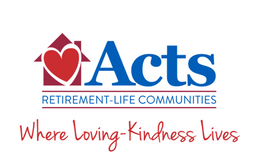Are You Prepared for Tax Season?
As you get older, your tax situation changes in a number of ways

(Editor’s note: This content is sponsored by Acts Retirement-Life Communities.)
Every year around this time, tax experts are inundated with questions. What do older people wonder about the most? Whether or not they need to file.
As you get older, your tax situation changes in a number of ways.
If you’re a retiree or if you’re helping an older relative with their taxes this year, here are some essential financial tips to help you get through the tax season:
1. If you’re over 65, you’re a senior in the eyes of the IRS.
Regardless of whether you’re still working or not, if you’ve hit your 65th birthday, you are officially a “senior” as far as the IRS is concerned. That means a whole new set of rules will apply when you set out to file your annual income tax return.
This sometimes confuses people. When it comes to Social Security, people get to pick the year they retire and start taking benefits, but your retired status is separate from your senior status. No choice in the latter: Everyone becomes a senior once they reach the age of 65 — at least in the eyes of the IRS.
Want more information on Social Security? Click here to learn how to apply for and start collecting Social Security — and most importantly what age you should start collecting.
2. Eyeball your deductions before working too hard to itemize them.
Before you start the onerous work of tallying up your itemized deductions for the year, take a look at the standard deduction. Older adults enjoy a higher standard deduction, so even if you’ve itemized your deductions in the past because it was worth it, that may no longer be the case. Take a look:
• Single filer: For tax year 2018, the standard deduction for a single filer is $12,000.
• Single filer 65+: For a single filer who’s 65 or older, the deduction is higher: $13,600.
• Married filing jointly. For these couples, the standard deduction is $24,000.
• Married filing jointly 65+. If either one of you has reached age 65, add $1,300 to that figure for each of you who is considered a senior. According to Intuit, instead of $24,000, your deduction would be $26,600 if you’re both over the age of 65.
3. Use the Social Security benefits worksheet.
The second-most common question from taxpayers is whether Social Security benefits are taxable. The short answer is: yes, they are. But you may not have to pay all (or any, in some cases) of those taxes, depending on your individual circumstances.
We’re headed into confusing territory, so it’s important to get help with your calculations. The IRS provides a handy worksheet (here's a previous one) to help taxpayers. It’s also available as part of tax software packages.
The amount you pay (if any) depends on your income. Many have other sources of income other than Social Security benefits, such as 401(k)s. Increasingly, older adults are still working. That income will determine your Social Security tax eligibility as well.
You can get a rough idea by taking your Social Security income and dividing it in half. Add that amount to the other sources of income you have. Don’t forget to include tax-exempt interest. The resulting number is called your combined income. If your combined income is over a certain amount, you’ll end up paying taxes on at least part of your Social Security income. For tax year 2017, the IRS says the base amount was $25,000 for single filers and $32,000 for married filing jointly.
4. Check for "senior-specific" tax breaks.
There are some tax credits you should apply for once you reach age 65. Chief among them is the Senior Tax Credit for the Elderly or Disabled. Not everyone qualifies as this credit is given only to those whose income falls below a certain level. To determine whether this credit applies to you, look for a form that senior taxpayers use: Schedule R.
If you live in a retirement community or are considering moving to a retirement community, you may want to consider the tax benefits some states provide. Did you know that moving to a retirement community can result in significant tax savings? Click here to learn about the financial security a retirement community can provide.
5. Be prepared to use a long tax form.
Since some tax credits aren’t available on the simple 1040EZ tax form, you’ll likely use Form 1040 or Form 1040A to receive the credits you’re entitled to. Unlike the 1040EZ, the instructions for these longer forms include the Social Security benefits worksheet mentioned earlier.
6. Carefully consider the tax implications of taking a pension lump sum payment.
If you’re offered the chance to take a lump sum rather than have your pension doled out to you over the years, be sure you understand the tax implications. If you withdraw all of it in a lump sum, your tax bill for that year could be quite a shock.
That’s because part or all of your lump sum payment will be taxable in the year you receive it. Some roll theirs over into an Individual Retirement Account (IRA) or into another pension plan to avoid having a hefty tax bill that year.
7. Get to know the forms you’ll be working with from now on.
When you worked, you most likely received a W-2 in the mail and used that to report your wages. Or perhaps you received a 1099-MISC, if you were a contractor.
As you get older, you should be on the lookout for Form SSA-1099 to figure Social Security benefits for tax purposes. If you receive a pension, you’ll want to look out for the 1099-R.
8. Find out about free tax help.
The IRS runs a program that brings together older adults and qualified tax assistant volunteers. There are two programs:
1. The Volunteer Income Tax Assistance (VITA) program. This is for anyone who makes less than $54,000, persons with disabilities or people who need help because their English is limited.
2. Tax Counseling for the Elderly (TCE). This is also free tax help and is offered to anyone 60 or older. The volunteers in this program know more about pensions and other retirement-related tax issues.
Both programs are staffed by IRS-certified volunteers and many are retired themselves. To find a program near you and to find out more about your taxes in general, visit the IRS website page for free tax help.
For more tax information, read Acts Retirement-Life Communities’ article "It’s Tax Season! How Are You Protecting Your Finances?"

Acts Retirement-Life Communities is the largest not-for-profit owner, operator and developer of continuing care retirement communities in the United States. Headquartered in suburban Philadelphia, Acts has a family of 23 retirement communities that serve approximately 8,500 residents and employ 6,200 in Pennsylvania, Delaware, Maryland, North and South Carolina, Georgia, Alabama and Florida. For more information about Acts visit actsretirement.org.

